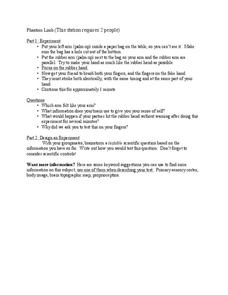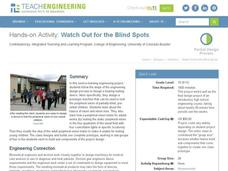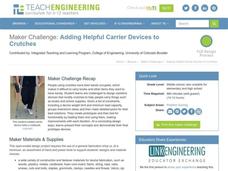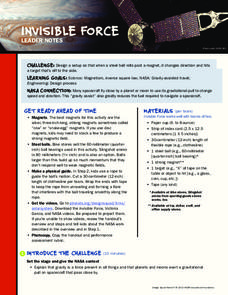Discovery Education
STEM Camp—Urban Infrastructure
Build a bridge to learning in a STEM-aligned unit about urban infrastructure. Young engineers explore the many aspects of civil planning and design in a five-day unit. Content includes the challenging aspects of balancing building with...
University of Minnesota
Neurotransmission Model
Don't lose your marbles — you'll need them for a lesson on neurotransmission. Young scholars build a neurotransmission model using marbles, beads, rubber bands, string, and other elements. After studying specific neurotransmitters,...
Scholastic
STEM Challenges and Activity Sheets 3–5
How can engineers help their communities? Three challenges in the first unit explore why STEM is important to communities and how neighborhoods are engineered to experience those benefits. The second unit prompts groups to plan an...
University of Minnesota
Phantom Limb
A phantom of neuroscience may leave pupils perplexed as they engage in an experimental lesson that recreates a phantom limb scenario. After experiencing the phenomenon, they choose a scientific question to explore further.
Scholastic
STEM Challenges and Activity Sheets for Grades 6–8
From 3-D cities to building bridges, young engineers engage in innovative STEM challenges that promote brainstorming and collaboration. Learners take on the roles of different types of engineers as well as become familiar...
American Physiological Society
Sit On It
How do product designers come up with the variety of things we see in stores and on TV every day? They identify a need, then create something that meets that need. Sounds simple, right? A two-week lesson puts seventh graders in that role...
LABScI
Catapult: Flight of the Marshmallows
Watch your marshmallows fly. The engaging STEM activity has groups create a catapult to launch marshmallows. After testing their prototypes, they consider improvements and redesign their catapults.
Teach Engineering
Watch Out for the Blind Spots
Applying engineering concepts to the field of medicine, pupils design a device to help test peripheral sight. The class learns and follows a specific design process for engineers before separating into groups; each group builds a...
Texas Education Agency (TEA)
Design and Draw a Mixed-Media Structure
Mix up your lessons with a resource on mixed-media structures. Scholars design a structure out of paper, balloons, and string that will lift a pencil to the greatest height; they construct the structure at a later time.
Teach Engineering
Chair Design
Can you design the perfect chair? Scholars apply the engineering design process to design and build a prototype of a new type of chair from wires. They test their designs with a wooden artist model or stuffed animal.
Institute of Electrical and Electronics Engineers
Smart Buildings and the Internet of Things
Is your building a smart building? Pupils learn what makes a building smart and about the internet of things. After viewing several videos on the topic, they conduct an activity collecting data from sensors and brainstorm ways to improve...
Teach Engineering
Battle of the Beams
Make the strongest beam possible using taffy? Groups mold a taffy-water mixture into a beam and a reinforcing material of their choice. To finish the final installment of a two-part series, participants test its strength by adding...
Teach Engineering
Fun Look at Material Science
Introduce materials science with a class demonstration. After showing a PowerPoint presentation on materials and their properties, instructors provide a ceramic tile, a Popsicle stick, a paper clip, and a plastic bag as examples of...
Teach Engineering
Biomimicry and Sustainable Design - Nature is an Engineering Marvel
Discover how copying nature can be beneficial to humans. Scholars read articles about examples of biomimicry and its potential applications. Along the way, they learn about Nature's Nine Laws and how they relate to biomimicry. This is...
Teach Engineering
Engineers Love Pizza, Too!
Help overcome challenges in eating pizza. Scholars work in groups to design a device that assists a physically handicapped person eat pizza. They build a prototype of such a device to test their designs before building. To finish, groups...
Science Matters
Earthquake Building/Shaking Contest
Japan is one of only a handful of countries that constructs buildings that are almost earthquake proof. The 13th lesson in the 20-part series challenges scholars to build structures to test against earthquakes. With limited materials and...
Teach Engineering
Amusement Park Ride: The Ups and Downs in Design
Groups design the ultimate roller coaster by considering potential and kinetic energy. They test their designs using marbles and then go on to rate each group's design based on aesthetics, loop diameter, and cost.
Teach Engineering
Maker Challenge: Adding Helpful Carrier Devices to Crutches
Make breaking a leg a less troublesome experience. Groups brainstorm designs for crutches that have devices that help carry items. They build prototypes of their devices to test out their designs.
Tech Museum of Innovation
Lighter than Air
Scholars participate in two design challenges concerning flight in the second instructional activity of the series. They design balloon crafts that have neutral buoyancy and forward motion.
Tech Museum of Innovation
Ant-Man Saves the Day
Provide Ant-Man with a flying device to aid in fighting crime. The first installment of a five-part unit has learners designing and building a flying device for Ant-Man. They write a narrative essay describing the engineering process...
PBS
Invisible Force
Investigate invisible forces. Young engineers design a setup that changes the direction of a steel ball using a magnetic force. The purpose of the setup is to model the gravitational pull of spacecraft by planetary bodies.
PBS
Inspector Detector
How do spacecraft detect magnetic fields? The fourth installment of a five-part unit has learners develop a device with magnets that allows for the detection of magnetic fields. They use a map of an imaginary planet to try out their...
PBS
Robo Arm
Future engineers create robotic arms like those on rovers built by NASA in the second lesson of the series. They test their devices by attempting to pick up and move cups to a specified location.
Tech Museum of Innovation
Launch It!
Launch a activity on flight with a challenging resource that asks scholars to first brainstorm and test ways to move a ping pong ball with given materials, then apply the results to design a launcher for them.

























